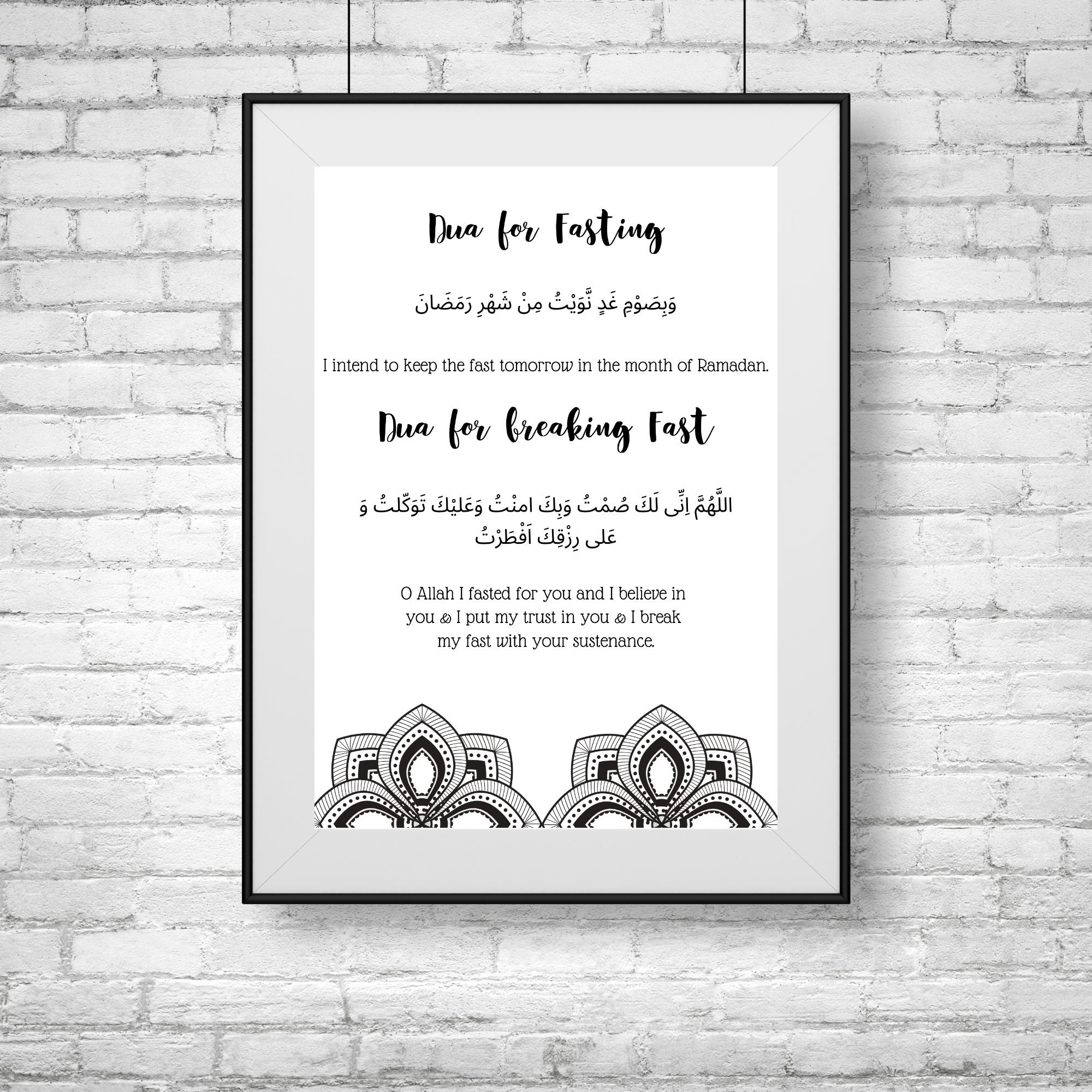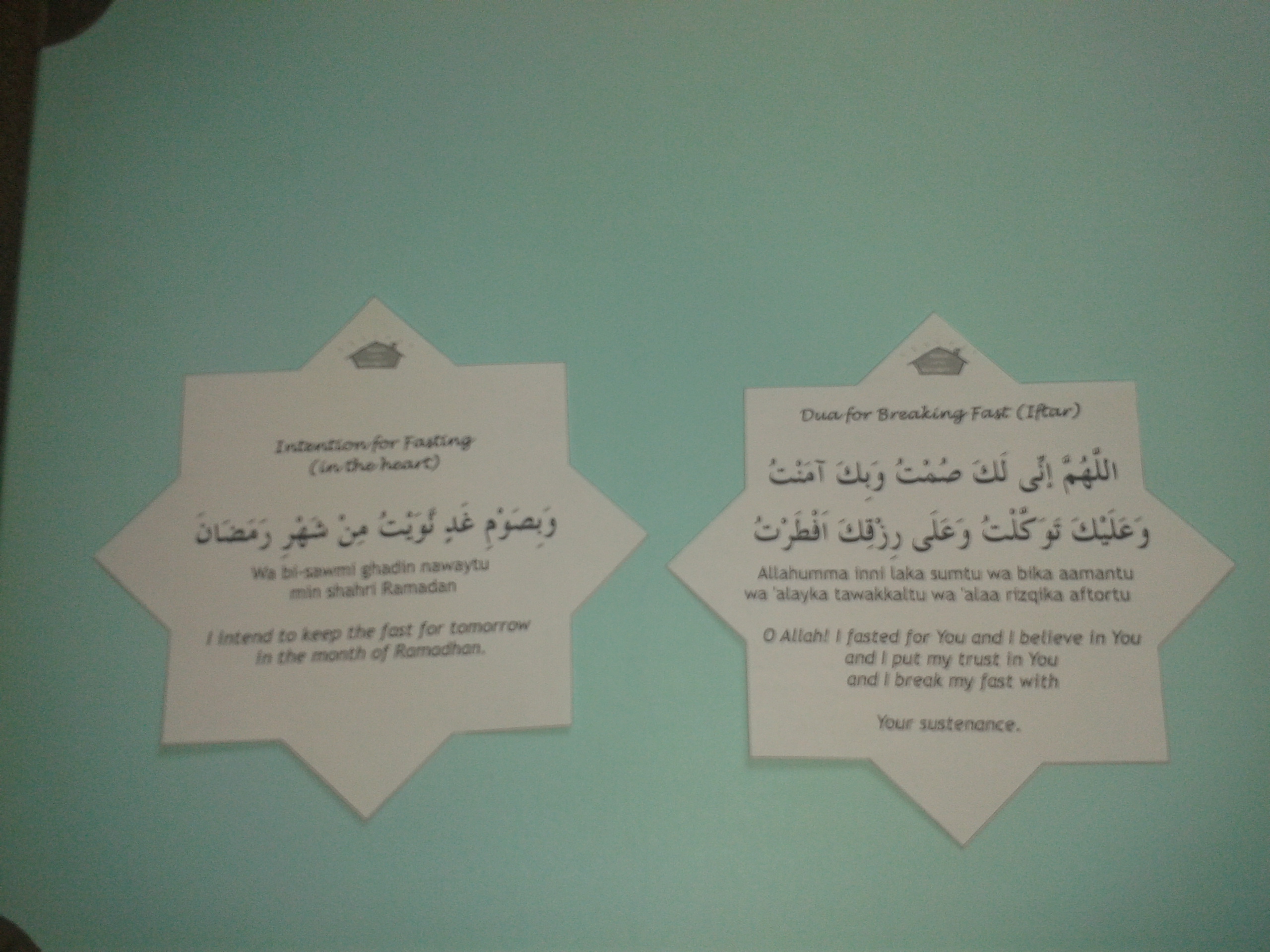
Ramadan Fasting Dua Roza Rakhne or Kholne Ki Dua The Stylish Life
The dua for fasting during Ramadan is short and simple, yet it conveys a very clear message of verbal intention. Reciting the dua, or supplication, is a vital component of fasting in Ramadan. Muslims recite this powerful prayer to seek Allah's blessings and guidance during their fast. The dua for fasting is a means of asking for forgiveness for.

4 duas for fasting Islaahi Advices
This dua speaks to the physical acts of fasting (referencing the importance of water in Islam) and according to the Prophet (pbuh) one of the best times to make dua is when breaking the fast. 2. Dua for opening fast

Fasting and Breaking Fast Dua Print Islamic Wall Art Etsy
Fasting (sawm) in Ramadan is one of the Five Pillars of Islam, an expression of our faith that reminds us of our frailty and brings us closer to Allah. As with any act, sincerity and intention are paramount, and the dua for fasting expresses our intent to fulfil our obligation to our Creator during this most blessed of months.

Ramadan Dua Breaking Fast Dua Islamic Prayer Muslim Prayer Etsy
There are three issues here that should not be confused: First, the acceptance of a fasting person's supplication and its timing. Second, the masnūn supplications specific to Ifṭār and their timing. Third, the ruling on congregational duʿāʾ in the Masjid before Ifṭār. Each of these issues are addressed separately.

Duas for Fasting
Allahumma inni laka sumtu wa ala rizq-ika-aftartu. O Allah! For You I have fasted and upon your provision, I have broken my fast. Abu Dawud: 2358. Read Duas about opening fast ,Rabbana Duas from Quran, Hajj Duas, Islamic Supplications with Arabic text and translations. You can find and learn Duas for everything you do in your daily life.

Arabic English Dua for fasting recite before and after during Ramadan Simply Impressions by
Du`a' When Breaking the Fast. A Muslim should be keen to follow the Sunnah in all aspects of his life, let alone in acts of worship. While fasting, a Muslim should be constant in making dhikr, doing good deeds, etc. In his well-known book, Fiqh As-Sunnah, the late Sheikh Sayyed Sabiq states: Ibn Majah reported from `Abdullah ibn `Amr ibn al.

Dua for Fasting Ramadan Duas Iftar and After Iftar Etsy
Q: What is the dua of sehri and what niyat should a person make when starting the fast in Ramadaan?A: There is no special Du'aa to begin the fast. You can make the Niyyat in your own language e.g. O Allah I am fasting tomorrow for you. So make it easy for me and accept it from me. The same Niyyat can be made in.

dua for breaking fast
While commencing the fast, one can say: 'Nawaitu Sawma Ghadin Lillahi Ta'ala' 'I intend to fast for this coming day for the sake of Allah'. While ending the fast, one can say: 'Allahumma laka sumtu wa ala rizqika aftartu' 'O Allah! I have fasted for your sake and with your sustenance do I break my fast'. And Allah Knows Best.

Du’as for Fasting 2LearnIslam
Fasting in Islam is compulsory during the whole month of Ramadan for adult Muslims, men and women. Fasting is a process of being prevented from eating, drinking, sexual activities, and any type of sins for a whole day. It is also one of the five pillars of Islam that belongs to faith in Allah. Muslims have to fast before sunrise to after sunset.

The Authentic Dua for Breaking Fast from Sunnah in Arabic & Meaning islamtics
1. Dua when you see the crescent moon -. 'Allah is the greatest. O Allah, bring us the crescent moon with safety, faith, peace, and Islam, and in agreement with all that You love and what pleases You. Our Lord and your Lord is Allah.' (Tirmidhi) 2. Dua when you start fasting (suhoor) -. 'I intend to keep a fast tomorrow in the month.

Dua for Breaking Fast Dua for Opening Fast
Hadith on Dua: Supplications of parent, fasting person, traveler. Anas ibn Malik reported: The Messenger of Allah, peace and blessings be upon him, said, " The supplications of three are not turned back: the supplication of a parent, the supplication of a fasting person, and the supplication of a traveler. ". عَنْ أَنَسِ بْنِ.

Dua For Opening Fasting In Arabic With Transliteration And English Translation Wazifamuslim
2- Dua for Fasting - Sehri Dua. Dua for Fasting in Ramadan, also known as Sehri Dua, Dua for Suhoor, Dua forSehri in different parts of the world is a Supplication when a person starts his/her fast during Ramadan. There is no specific Dua before Fasting in Hadith. However, what is prescribed is to say:

Dua For Ramadan Fasting نصائح مالية
Dua for Opening Fast. A person's intention of fasting enhances his consciousness. It confirms their inner self and with the verbal notes, they seek the pleasure of their Rabb in their upcoming act. When you are done with Suhoor (the meal before fasting), you should read this Dua to initiate your fast:

Dua for OPENING THE FAST Islamic Du'as (Prayers and Adhkar)
Dua (Prayer) at the Beginning of the Fast 1 وَبِصَوْمِ غَدٍ نَّوَيْتُ مِنْ شَهْرِ رَمَضَانَ. Wa bisawmi ghadinn nawaiytu min shahri ramadan. I intend to keep the fast for tomorrow in the month of Ramadan. Or you can also recite the following: Dua (Prayer) at the Beginning of the Fast 2

Iftar Dua Break Your Fast by Reciting Ramadan Iftar Dua
Dua for Fasting. Fasting on the first nine days of Dhul Hijjah is an important Sunnah. Fasting itself is one of the most beloved acts of worship. But fasting on these blessed days, especially on the 9th day, the Day of Arafah, in particular, brings great rewards and forgiveness of sins. When you open your fast, recite the following Dua:

Flashcards Intention for Fasting (in the Heart) and Dua for Breaking Fast The Islamic Home
The Prophet (peace and blessings of Allah be upon him) said: "Whoever does not intend to fast before dawn, there is no fast for him." (Narrated by al-Tirmidhi, 730) According to a version narrated by al-Nasai (2334): "Whoever does not intend to fast from the night before, there is no fast for him." (Classed as hasan by al-Albani in Sahih al-Tirmidhi, 573)